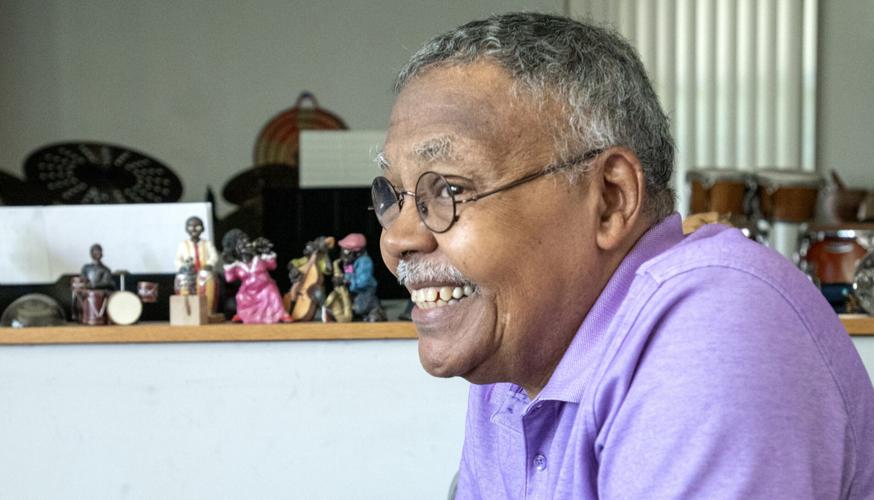Want to purchase today’s print edition? Here’s a map of single-copy locations.
URBANA — If you’ve ever been to any school gym for a game or graduation ceremony and sat on a long piece of plastic making up a row in the bleachers, there’s one man you can thank for providing that seat.
He’s from Urbana.
Robert Lewis has worn plenty of hats in his time: engineer, music teacher, alderman.
One of his proudest moments, though, was when his patent for a “contour seat module,” designed for the American Seating Co., went international after it was filed in 1985.
It wasn’t his only patent either, as his engineering for the American Seating Co. had him working on everything from nitrogen gas injections into plastic to torsional loading induced by seating elements.
A good deal of that work happened before he turned 30.
“I said, ‘I don’t have time for that,’” Lewis said.
He’d been diagnosed with a blood condition called Factor IX hemophilia as a child and told he wouldn’t live past 25.
“I didn’t really believe that,” Lewis said. “But I had it in my head that I gotta hurry up and get things done.”
After many more years of getting things done, he’s set to be recognized by the Champaign Urbana Schools Foundation at today’s Distinguished Alumni Honoree Reception at the I Hotel.
The 1964 graduate of Urbana High School has been selected for the Local Hero Award, highlighting his work teaching art and music, which has played as big a role in his life as engineering.
Urbana Superintendent Jennifer Ivory-Tatum led the charge on his nomination, but included testimony from others in the community who have worked with Lewis.
One, Franklin STEAM Academy music educator Abby Heras, calls him “a local treasure.”
“The knowledge and history this man possesses is unreal and should be documented,” Heras said. “Any time I sit with Mr. Lewis, I learn something new, either about the community, history or myself.”
Heras works with Lewis at Banks Bridgewater Lewis Fine Arts Academy, so the pair have spent plenty of time together, leaving her impressed with his love and work for the local community.
“He wants to see the next generations thrive and does what he can to support it,” she said. “Some ways it’s teaching through music, at times it can be through his engineering lens and some ways it’s teaching lessons through the Bible. If you’re lucky, he will tie it all together and blow you away.”
Engineering and music became part of Lewis’ life at nearly the same time, thanks to his parents’ friends, the Wylies.
Lorenzo Wylie, a mechanic, let Lewis work in the garage while his wife Doris Wiley, a piano teacher, taught him to play jazz and sing.
Mr. Wylie had once built race cars in the 1920s and ’30s for the Indianapolis 500 (and Formula One racing later became a love for Lewis and his late wife, Rosalind), so he was the perfect advisor when Lewis built a car as a teen.
“That sucker could get almost 570 horsepower,” Lewis said, though Mr. Wylie wanted to help him get it to 600. “I wanted to race it, but I couldn’t. I wasn’t of age to get a license.”
Meanwhile, Lewis joined the Urbana High School band on the drumline, adding more instruments to his repertoire.
Lewis graduated high school and, still feeling a ticking clock ahead of him, joined a nine-month engineering, architecture and design program.
“It was nine months of intense study, and once you finished that nine months, you are guaranteed a job,” Lewis said. “You know how many kids started? Seventeen.”
Two made it to the end.
Lewis had to work hard through math and science, but the artistic angle was no issue at all.
He found that architectural design wasn’t his thing.
“Building boxes for people, houses and things, sucks,” Lewis remembers telling an industrial design professor.
That professor said he’d need a Ph.D. to have the freedom in design work he wanted, but Lewis didn’t think he had the time.
Fortunately, his work showed for itself, and before long he had work at companies that included the American Seating Co., now American Seating Inc., designing a wide variety of products.
“The way my condition was, I want to do as much as I can while I can,” Lewis said. “And I did, basically.”
Despite offers to move as far as Japan for work, Lewis has spent most of his life in Urbana, where he wanted to raise his kids, Eric and Nicole.
(Another of his proudest moments: watching each of his children graduate college.)
Later in life, he was elected to the Urbana City Council, representing Ward 3, where he lives.
He can point out his window at one impact of his term.
“The (street) lighting here is state-of-the-art. In this whole area, it’s the best you can get,” Lewis said.
He ran with a promise of improving infrastructure and did as much as he could, prioritizing projects he believed were important as an engineer, such as replacing old water lines.
“One of the objectives in your role is your fiduciary responsibility to your constituents. I had noticed, because I live in this community, that there were streets that had not been touched since I was a little boy,” Lewis said. “So I made it a priority.”
After eight years as an alderman, Lewis chose to step down despite having supporters for re-election, holding to his personal belief in term limits.
Music and fine arts, from painting to sculpture, remained an important part of his life and inspired him to start the Mo’Betta Music Program.
It later evolved to be part of the Banks Bridgewater Lewis Fine Arts Academy, where Lewis and other teachers offer supplementary curriculum on blues, jazz, gospel, R&B and soul as well as visual arts.
Lewis’ house is decorated with his own paintings, a collection of fine arts pieces and work given to him by his students.
One day, they might be designing bracelets with unique patterns. Another, throwing paint-filled balloons. Another, painting fish and using glaze to look like water.
They don’t stop at art, either, as Lewis, Nathaniel Banks and Ron Bridgewater can call on connections at the University of Illinois to go learn about anything from chemistry to nanotechnology.
“There’s a lot of little things that kids can do to make them think about what they’re doing. That’s what I want to do,” Lewis said. “Because if they think about it, they’ll want to do it all the time. They’ll do it better.”











